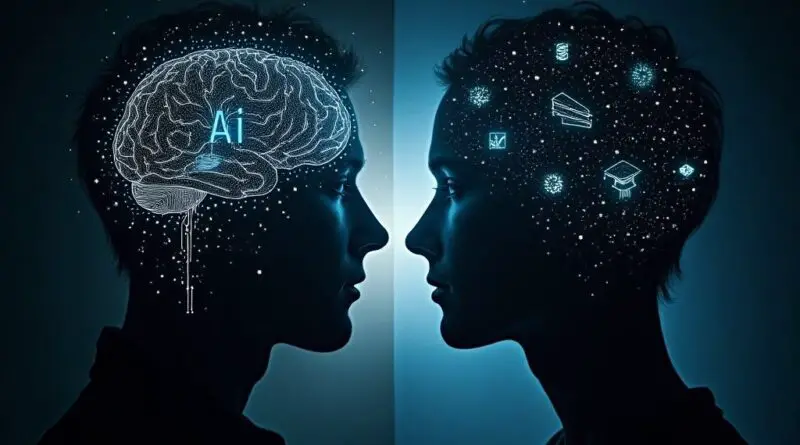AI vs Human Intelligence: Should Students Be Scared of AI?
AI vs Human Intelligence: Should Students Be Scared of AI? 🤖🧠
Artificial Intelligence (AI) has become one of the most talked-about topics across industries, especially in education. From AI-powered chatbots helping students solve math problems to automated essay graders, AI is making a significant impact. But here comes the big question: “Should students be scared of AI?”
Let’s break it down in a human-friendly way, using real-life examples, understandable language, and even a few emojis to keep things light and engaging 😉
🔧 What is Artificial Intelligence (AI)?
AI refers to machines or computer programs that are designed to mimic human intelligence. These systems can learn, reason, and even make decisions. Some popular AI examples include:
- Siri or Alexa answering your questions
- ChatGPT helping you write assignments
- Google Maps predicting traffic
- Netflix recommending shows
AI works based on data, algorithms, and learning models. The more data it gets, the smarter it becomes.
Fun Fact: AI doesn’t think like a human. It doesn’t have emotions, beliefs, or creativity like us. It only works based on the information fed to it.
🤔 Human Intelligence vs AI: What’s the Difference?
Let’s compare both using a simple table:
| Feature | Human Intelligence | Artificial Intelligence |
|---|---|---|
| Emotions | Yes | No |
| Creativity | High | Limited |
| Learning Method | Experience-based | Data-based |
| Adaptability | Very Flexible | Limited to programming |
| Decision Making | Contextual & Emotional | Logical and Data-Driven |
| Evolution | Over thousands of years | Rapid, in decades |
😱 Why Are Students Scared of AI?
Here are some common fears students have:
- AI will take over our jobs 😕
- AI will make teachers and learning obsolete 🚫
- I won’t need to study, AI will do everything 🤷♂️
Let’s address these fears, one by one.
Also Read,
What Is AI? Explained in Simple Words for Beginners
New Features in ChatGPT, Gemini & Copilot
🏋️♂️ AI and the Future of Jobs
Many believe that AI will replace jobs. While it’s true that automation will change the job market, it doesn’t mean jobs will vanish. Instead, new types of jobs will emerge.
Real Example:
- Earlier, typists were in high demand. Now, we all type using laptops and phones.
- Today, data analysts and AI trainers are in demand — jobs that didn’t exist 10 years ago.
According to the World Economic Forum, AI will create 97 million new jobs by 2025 (source).
Moral: Learn new skills. Don’t fear AI. Work with it, not against it.
🏫 Will AI Replace Teachers?
AI is good at grading and answering factual questions, but it can’t replace the emotional connection and mentorship a teacher provides.
Real Example:
- AI can correct grammar, but only a teacher can motivate a student who’s feeling low.
- Tools like Khan Academy and Coursera use AI to personalize learning, but human instructors are still at the core.
Moral: AI is a tool, not a replacement for human touch.
📚 AI as a Learning Buddy, Not a Cheating Partner
Using AI tools like ChatGPT can be helpful, but don’t let it do your homework completely. Instead, use it to:
- Understand difficult topics
- Get ideas for assignments
- Practice interview questions
Tip: Learn to ask better questions to get the best out of AI. That’s called Prompt Engineering 🔧
🧑💻 Skills You Need in the Age of AI
To stay ahead in this AI-driven world, students should develop the following skills:
- Critical Thinking – Question what AI gives you.
- Creativity – Come up with unique ideas, something AI lacks.
- Emotional Intelligence – Be empathetic and understanding.
- Coding and Data Skills – Understand how AI works.
- Adaptability – Be open to change and learn continuously.
Recommended Resource: Check out Google’s AI courses to start learning for free!
🚀 Real-Life AI in Education Examples
- Duolingo – Uses AI to personalize language learning.
- Grammarly – Uses AI to improve your writing.
- Turnitin – Detects plagiarism using AI.
- BYJU’S – Uses machine learning to understand student performance.
- Quizlet – Uses AI to help students learn faster.
All these tools support students, not replace them.
👁️ How to Use AI Responsibly?
Students must learn to use AI ethically:
- Don’t copy answers blindly.
- Always cross-check information.
- Use AI to understand, not to escape studying.
Tip: Treat AI like a calculator. It helps you, but you still need to understand the formula.
🌟 Benefits of AI in Student Life
- 📚 24×7 Assistance – No waiting for doubt clearance.
- ⏰ Time Saver – Automates repetitive tasks.
- 👨🎓 Personalized Learning – Everyone learns at their own pace.
- 🤝 Inclusive Education – Helps students with disabilities.
🧑💼 AI + Human = Superpower
Rather than fearing AI, think of combining human creativity with AI’s speed and logic. That’s unbeatable!
Steve Jobs once said: “Technology is nothing. What’s important is that you have faith in people.”
❓ Final Verdict: Should Students Be Scared of AI?
NO. Students should not be scared of AI. Instead, they should:
- Embrace it as a tool
- Learn how it works
- Use it to grow their skills
- Think critically and act ethically
🚀 The future belongs to those who adapt, learn, and evolve.
So next time you hear someone say “AI will take over everything,” remind them — only if we let it!
📅 Stay Updated & Keep Learning
Want more tips on how to use AI for your studies, job prep, or career growth?
✅ Bookmark this blog ✅ Share it with your friends
📤 Stay Updated with NextGen Careers Hub
📱 Follow us on Instagram
📺 Subscribe us on YouTube
Please share our website with others: NextGenCareersHub.in






Comments are closed.